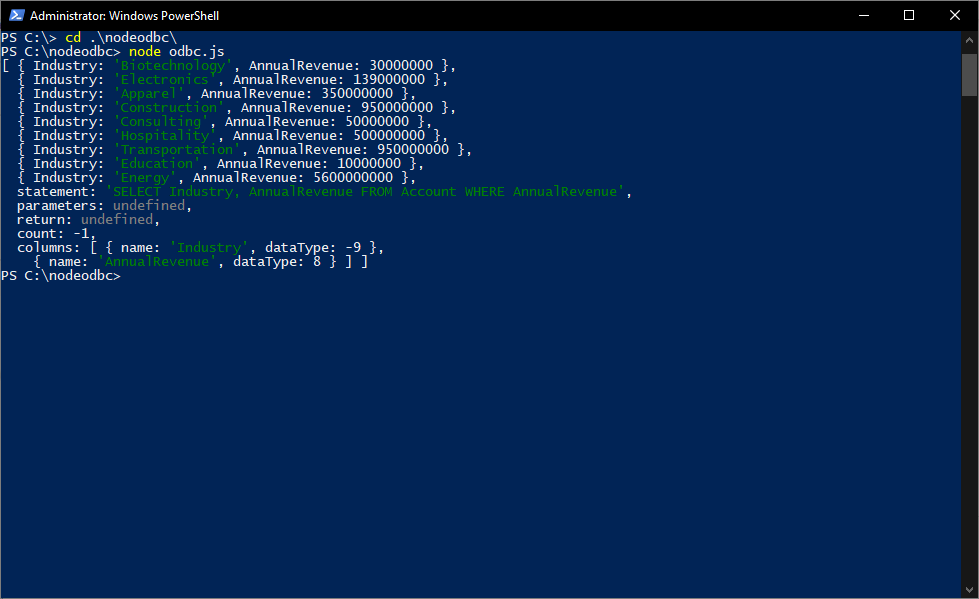Model Context Protocol (MCP) finally gives AI models a way to access the business data needed to make them really useful at work. CData MCP Servers have the depth and performance to make sure AI has access to all of the answers.
Try them now for free →Query Elasticsearch Data through ODBC in Node.js
Use node-odbc to execute SQL queries against Elasticsearch data from Node.js.
Node.js is a JavaScript runtime environment that allows you to run JavaScript code outside of a browser. With the CData ODBC Driver for Elasticsearch, you can access live Elasticsearch data from Node.js apps and scripts. In this article, we walk through installing node-odbc and the required tools to create a simple Node.js app with access to live Elasticsearch data.
With built-in optimized data processing, the CData ODBC Driver offers unmatched performance for interacting with live Elasticsearch data in Node.js. When you issue complex SQL queries from Node.js to Elasticsearch, the driver pushes supported SQL operations, like filters and aggregations, directly to Elasticsearch and utilizes the embedded SQL engine to process unsupported operations client-side (often SQL functions and JOIN operations).
About Elasticsearch Data Integration
Accessing and integrating live data from Elasticsearch has never been easier with CData. Customers rely on CData connectivity to:
- Access both the SQL endpoints and REST endpoints, optimizing connectivity and offering more options when it comes to reading and writing Elasticsearch data.
- Connect to virtually every Elasticsearch instance starting with v2.2 and Open Source Elasticsearch subscriptions.
- Always receive a relevance score for the query results without explicitly requiring the SCORE() function, simplifying access from 3rd party tools and easily seeing how the query results rank in text relevance.
- Search through multiple indices, relying on Elasticsearch to manage and process the query and results instead of the client machine.
Users frequently integrate Elasticsearch data with analytics tools such as Crystal Reports, Power BI, and Excel, and leverage our tools to enable a single, federated access layer to all of their data sources, including Elasticsearch.
For more information on CData's Elasticsearch solutions, check out our Knowledge Base article: CData Elasticsearch Driver Features & Differentiators.
Getting Started
Connecting to Elasticsearch Data
If you have not already done so, provide values for the required connection properties in the data source name (DSN). You can use the built-in Microsoft ODBC Data Source Administrator to configure the DSN. This is also the last step of the driver installation. See the "Getting Started" chapter in the help documentation for a guide to using the Microsoft ODBC Data Source Administrator to create and configure a DSN.
Set the Server and Port connection properties to connect. To authenticate, set the User and Password properties, PKI (public key infrastructure) properties, or both. To use PKI, set the SSLClientCert, SSLClientCertType, SSLClientCertSubject, and SSLClientCertPassword properties.
The data provider uses X-Pack Security for TLS/SSL and authentication. To connect over TLS/SSL, prefix the Server value with 'https://'. Note: TLS/SSL and client authentication must be enabled on X-Pack to use PKI.
Once the data provider is connected, X-Pack will then perform user authentication and grant role permissions based on the realms you have configured.
Building node-odbc
In order to connect to Elasticsearch through the CData ODBC Driver, you need to build node-odbc manually (after installing the required tools).
Installing the Required Tools
The following commands install the tools required to build node-odbc (note the -g parameter, which installs the tools globally).
npm i -g windows-build-tools npm i -g node-gyp
Building node-odbc
After installing the required tools, create a directory for the Node.js app and install odbc (which builds the binary for us to use in our Node.js script).
mkdir nodeodbc cd nodeodbc npm i -g node
Querying Elasticsearch from Node.js
With the ODBC Driver installed, a DSN Configured, and node-odbc built, we are ready to query live Elasticsearch data from a Node.js app. The sample code below connects to a specific DSN and queries the Orders table.
myscript.js
const odbc = require('odbc');
async function queryElasticsearch() {
const connection = await odbc.connect(`DSN=CData Elasticsearch Source`);
const data = await connection.query('SELECT OrderName, Freight FROM Orders');
console.log(data);
}
queryElasticsearch();
Once you write the app, use node to execute the script:
node myscript.js

Download a free, 30-day trial of the CData ODBC Driver for Elasticsearch and start working with your live Elasticsearch data in Node.js. Reach out to our Support Team if you have any questions.

